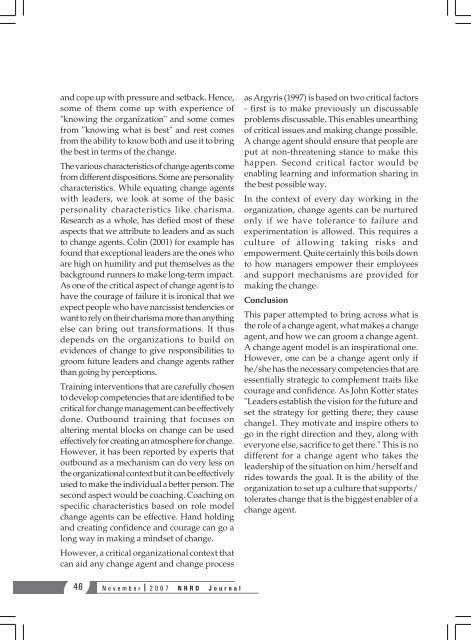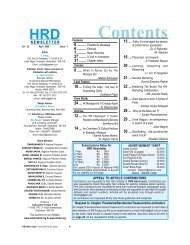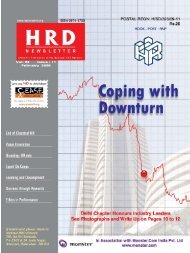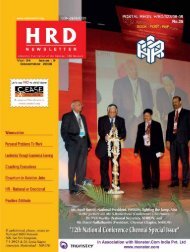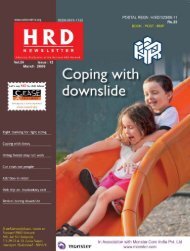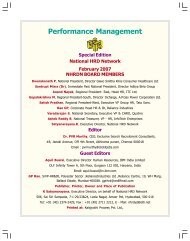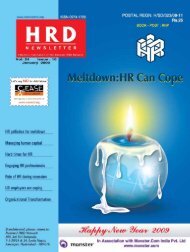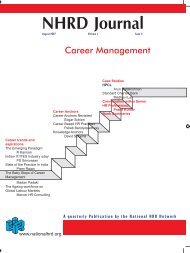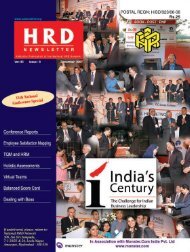NHRD Journal - National HRD Network
NHRD Journal - National HRD Network
NHRD Journal - National HRD Network
You also want an ePaper? Increase the reach of your titles
YUMPU automatically turns print PDFs into web optimized ePapers that Google loves.
and cope up with pressure and setback. Hence,<br />
some of them come up with experience of<br />
"knowing the organization" and some comes<br />
from "knowing what is best" and rest comes<br />
from the ability to know both and use it to bring<br />
the best in terms of the change.<br />
The various characteristics of change agents come<br />
from different dispositions. Some are personality<br />
characteristics. While equating change agents<br />
with leaders, we look at some of the basic<br />
personality characteristics like charisma.<br />
Research as a whole, has defied most of these<br />
aspects that we attribute to leaders and as such<br />
to change agents. Colin (2001) for example has<br />
found that exceptional leaders are the ones who<br />
are high on humility and put themselves as the<br />
background runners to make long-term impact.<br />
As one of the critical aspect of change agent is to<br />
have the courage of failure it is ironical that we<br />
expect people who have narcissist tendencies or<br />
want to rely on their charisma more than anything<br />
else can bring out transformations. It thus<br />
depends on the organizations to build on<br />
evidences of change to give responsibilities to<br />
groom future leaders and change agents rather<br />
than going by perceptions.<br />
Training interventions that are carefully chosen<br />
to develop competencies that are identified to be<br />
critical for change management can be effectively<br />
done. Outbound training that focuses on<br />
altering mental blocks on change can be used<br />
effectively for creating an atmosphere for change.<br />
However, it has been reported by experts that<br />
outbound as a mechanism can do very less on<br />
the organizational context but it can be effectively<br />
used to make the individual a better person. The<br />
second aspect would be coaching. Coaching on<br />
specific characteristics based on role model<br />
change agents can be effective. Hand holding<br />
and creating confidence and courage can go a<br />
long way in making a mindset of change.<br />
However, a critical organizational context that<br />
can aid any change agent and change process<br />
as Argyris (1997) is based on two critical factors<br />
- first is to make previously un discussable<br />
problems discussable. This enables unearthing<br />
of critical issues and making change possible.<br />
A change agent should ensure that people are<br />
put at non-threatening stance to make this<br />
happen. Second critical factor would be<br />
enabling learning and information sharing in<br />
the best possible way.<br />
In the context of every day working in the<br />
organization, change agents can be nurtured<br />
only if we have tolerance to failure and<br />
experimentation is allowed. This requires a<br />
culture of allowing taking risks and<br />
empowerment. Quite certainly this boils down<br />
to how managers empower their employees<br />
and support mechanisms are provided for<br />
making the change.<br />
Conclusion<br />
This paper attempted to bring across what is<br />
the role of a change agent, what makes a change<br />
agent, and how we can groom a change agent.<br />
A change agent model is an inspirational one.<br />
However, one can be a change agent only if<br />
he/she has the necessary competencies that are<br />
essentially strategic to complement traits like<br />
courage and confidence. As John Kotter states<br />
"Leaders establish the vision for the future and<br />
set the strategy for getting there; they cause<br />
change1. They motivate and inspire others to<br />
go in the right direction and they, along with<br />
everyone else, sacrifice to get there." This is no<br />
different for a change agent who takes the<br />
leadership of the situation on him/herself and<br />
rides towards the goal. It is the ability of the<br />
organization to set up a culture that supports/<br />
tolerates change that is the biggest enabler of a<br />
change agent.<br />
46<br />
November 2007 <strong>N<strong>HRD</strong></strong> <strong>Journal</strong>


